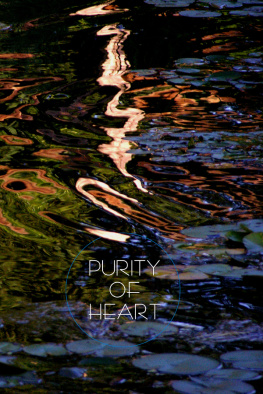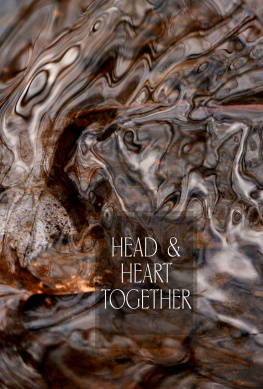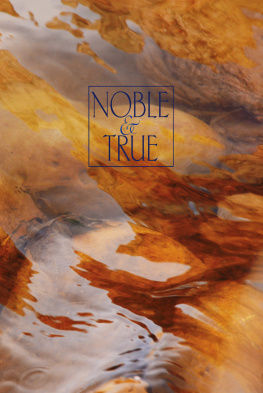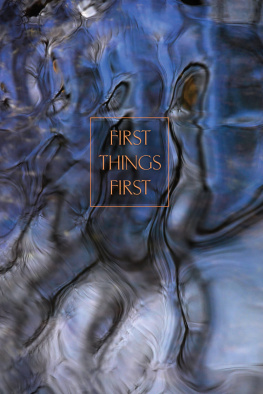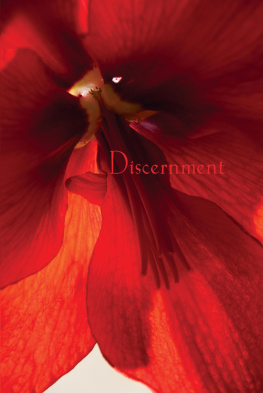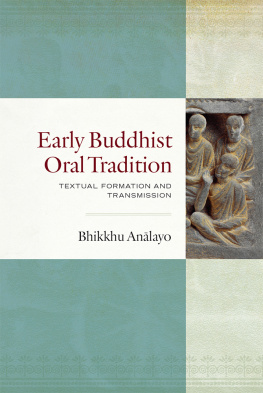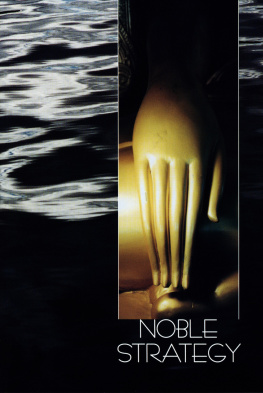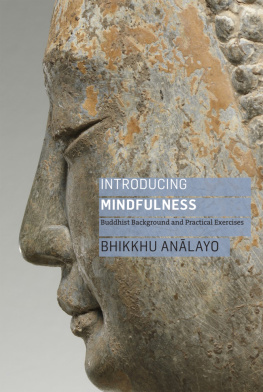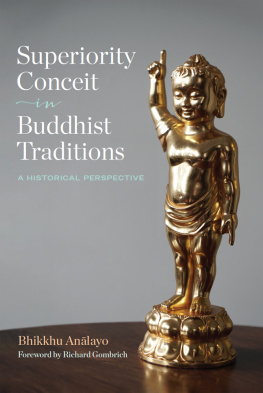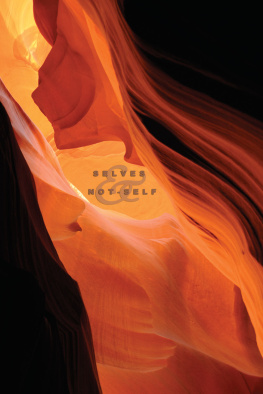Thanissaro Bhikkhu - Purity of Heart: Essays on the Buddhist Path
Here you can read online Thanissaro Bhikkhu - Purity of Heart: Essays on the Buddhist Path full text of the book (entire story) in english for free. Download pdf and epub, get meaning, cover and reviews about this ebook. year: 2006, publisher: Metta Forest Monastery, genre: Religion. Description of the work, (preface) as well as reviews are available. Best literature library LitArk.com created for fans of good reading and offers a wide selection of genres:
Romance novel
Science fiction
Adventure
Detective
Science
History
Home and family
Prose
Art
Politics
Computer
Non-fiction
Religion
Business
Children
Humor
Choose a favorite category and find really read worthwhile books. Enjoy immersion in the world of imagination, feel the emotions of the characters or learn something new for yourself, make an fascinating discovery.
- Book:Purity of Heart: Essays on the Buddhist Path
- Author:
- Publisher:Metta Forest Monastery
- Genre:
- Year:2006
- Rating:5 / 5
- Favourites:Add to favourites
- Your mark:
- 100
- 1
- 2
- 3
- 4
- 5
Purity of Heart: Essays on the Buddhist Path: summary, description and annotation
We offer to read an annotation, description, summary or preface (depends on what the author of the book "Purity of Heart: Essays on the Buddhist Path" wrote himself). If you haven't found the necessary information about the book — write in the comments, we will try to find it.
Thanissaro Bhikkhu: author's other books
Who wrote Purity of Heart: Essays on the Buddhist Path? Find out the surname, the name of the author of the book and a list of all author's works by series.
Purity of Heart: Essays on the Buddhist Path — read online for free the complete book (whole text) full work
Below is the text of the book, divided by pages. System saving the place of the last page read, allows you to conveniently read the book "Purity of Heart: Essays on the Buddhist Path" online for free, without having to search again every time where you left off. Put a bookmark, and you can go to the page where you finished reading at any time.
Font size:
Interval:
Bookmark:
This work is licensed under the Creative Commons Attribution-NonCommercial 4.0 Unported. To see a copy of this license visit http://creativecommons.org/licenses/by-nc/4.0/. Commercial shall mean any sale, whether for commercial or non-profit purposes or entities.
Metta Forest Monastery
Valley Center, CA 92082-1409
U.S.A.
More Dhamma talks, books and translations by Thanissaro Bhikkhu are available to download in digital audio and various ebook formats at dhammatalks.org.
A paperback copy of this book is available free of charge. To request one, write to: Book Request, Metta Forest Monastery, PO Box 1409, Valley Center, CA 92082 USA.
Many people have read earlier versions of these essays and have kindly offered suggestions for improvements. In particular, I would like to thank the monks here at the monastery, as well as Jane Yudelman, Barbara Wright, Olivia Vaz, Mary Talbot, Donald Swearer, Clark Strand, Ralph Steele, Larry Rosenberg, Xiaoquan Osgood, Nate Osgood, Hope Millholland, Bok-Lim Kim, Gil Fronsdal, Eugene Cash, John Bullitt, and Michael Barber. Any mistakes that remain, of course, are my own responsibility.
Some of these essays, in earlier incarnations, have appeared in Tricycle, Buddhadharma, Inquiring Mind, and Insight Journal. I would like to thank the editors of these journals for their help in making the writing clearer and more coherent. The fact that the essays were originally intended for different audiences explains the overlap that occasionally occurs among them, as well as the inconsistent use of Sanskrit and Pali terms: dharma, karma, and nirvana in some essays; dhamma, kamma, and nibbana in others. I hope that this poses no difficulties.
These and other essays on Buddhist practice are available on the Internet at www.accesstoinsight.org and www.dhammatalks.org.
Thanissaro Bhikkhu
(Geoffrey DeGraff)
During my first weeks with my teacher, Ajaan Fuang, I began to realize that he had psychic powers. He never made a show of them, but I gradually sensed that he could read my mind and anticipate future events. I became intrigued: What else did he know? How did he know it? He must have detected where my thoughts were going, for one evening he gently headed me off: You know, he said, the whole aim of our practice is purity of heart. Everything else is just games.
That one phrasepurity of heartmore than intrigued me. It reverberated deep down inside. Although I was extremely disillusioned with Christianity, I still valued Kierkegaards dictum: Purity of heart is to will one thing. I didnt agree with Kierkegaard as to what that one thing was, but I did agree that purity of heart is the most important treasure of life. And here Ajaan Fuang was offering to teach me how to develop it. Thats one of the reasons why I stayed with him until he died.
His basic definition of purity of heart was simple enough: a happiness that will never harm anyone. But a happiness like that is hard to find, for ordinary happiness requires that we eat. As the first of the Novices Questions says: What is one? All beings subsist on food. This is how the Buddha introduced the topic of causality to young people: The primary causal relationship isnt something gentle like light reflecting off mirrors, or jewels illuminating jewels. Its feeding. Our bodies need physical food for their well-being. Our minds need the food of pleasant sensory contacts, intentions, and consciousness itself in order to function. If you ever want proof that interconnectedness isnt always something to celebrate, just contemplate how the beings of the world feed on one another, physically and emotionally. Interbeing is inter-eating. As Ajaan Suwat, my second teacher once said, If there were a god who could arrange that by my eating I could make everyone in the world full, Id bow down to that god. But thats not how eating works.
Ordinarily, even well-intentioned people may not see eating as harmful. Were so compelled to eat that we blind ourselves to its larger impact. Our first pleasure, after the terror of being born, was getting to feed. We did it with our eyes closed, and most people keep their eyes closed to the impact of their feeding throughout life.
But when you go to a quiet, secluded place and start examining your life, you begin to see what an enormous issue it is just to keep the body and mind well fed. On the one hand, you see the suffering you create for others simply in your need to feed. On the other, you see something even more dismaying: the emotions that arise within you when you dont feel that your body and mind are getting enough to eat. You realize that as long as your source of physical or mental food is unreliable, youre unreliable, too. You see why even good people can reach a point where theyre capable of murder, deceit, adultery, or theft. Being born with a body means that were born with a huge bundle of needs that compels and can overwhelm our minds.
Fortunately, we human beings have the potential to civilize our eating habits by learning to wean ourselves from our passion for the junk food of sights, sounds, smells, etc., and look instead for good food within. When we learn to appreciate the joy that comes from generosity, honor, compassion, and trust, we see that its much more fulfilling than the pleasure that comes simply from grabbing what we can for ourselves. We realize that our happiness cant be independent of the happiness of others. We can give one another our belongings, our time, our love, our selves, and see it not as a loss but as a mutual gain.
Unfortunately, these qualities of the heart are conditional, for they depend on a tender web of beliefs and feelingsbelief in justice and the basic goodness of human nature, feelings of trust and affection. When that web breaks, as it so easily can, the heart can turn vicious. We see this in divorce, broken families, and society at large. When the security of our food sourcethe basis of our mental and material well-beinggets threatened, the finer qualities of the mind can vanish. People who believe in kindness can suddenly seek revenge. Those who espouse non-violence can suddenly call for war. And those who rule by divisivenessby making a mockery of compassion, prudence, and our common humanityfind a willing following for their law-of-the-jungle agenda.
This is why compassion based only on belief or feeling is not enough to guarantee our behaviorand why the practice of training the mind to reach an unconditioned happiness is not a selfish thing. If you value compassion and trust, its an imperative, for only an unconditioned happiness can guarantee the purity of your behavior. Independent of space and time, its beyond alteration. No one can threaten its food source, for it has no need to feed. When youve had even just a glimpse of this happiness, your belief in goodness becomes unshakable. That way other people can totally trust you, and you can genuinely trust yourself. You lack for nothing.
Purity of heart is to know this one thing.
The Buddha never placed unconditional demands on anyones faith. For people from a culture where the dominant religions do make such demands, this is one of Buddhisms most attractive features. Its especially appealing to those whoin reaction to the demands of organized religionembrace the view of scientific empiricism that nothing deserves our trust unless it can be measured against physical data. In this light, the Buddhas famous instructions to the Kalamas are often read as an invitation to believe, or not, whatever we like.
Font size:
Interval:
Bookmark:
Similar books «Purity of Heart: Essays on the Buddhist Path»
Look at similar books to Purity of Heart: Essays on the Buddhist Path. We have selected literature similar in name and meaning in the hope of providing readers with more options to find new, interesting, not yet read works.
Discussion, reviews of the book Purity of Heart: Essays on the Buddhist Path and just readers' own opinions. Leave your comments, write what you think about the work, its meaning or the main characters. Specify what exactly you liked and what you didn't like, and why you think so.

